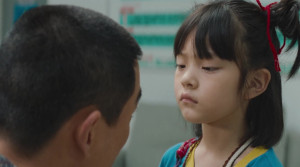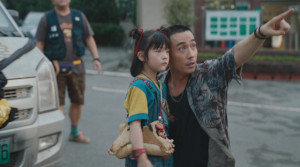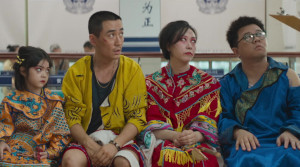

Rensheng Dashi
China 2022
Genre:
Drama, Comedy
Director:
Liu Jiangjiang
Cast:
Zhu Yilong
Yang Enyou
Wang Ge
Wu Qian
Liu Lu
Luo Jingmin
Chen Chuang
Xiao’ai

Lighting Up the Stars

Story: One day, Wu Xiaowen (Yang Enyou) wakes up next to her dead grandmother. It doesn't take long and Mo Sanmei (Zhu Yilong) from the funeral home "Up Sky" is on site and prepares the corpse for pickup. That's when Xiaowen jumps out and wants Sanmei to leave her grandmother alone. The five-year-old even shows up at the funeral home and wants to know where her grandmother is. But Sanmei has other problems too. For example, his girlfriend left him after he went to jail for messing with the man, she was cheating on him with. In addition, Sanmei's father (Luo Jingmin) wants to transfer the company to his son under certain conditions, but he is profoundly dissatisfied with him and is not on good terms with him. When Xiaowen shows up at their funeral home again, her parents can't pick her up. The girl's family history is complicated, and they are in fact not her real parents. But because they have to go to Beijing for a few days, they pay Sanmei for leaving the five-year-old with him. His life is soon turned upside down because the cheeky little girl has her own will. Over time, however, it turns out that Xiaowen can also be quite useful in attracting customers. In addition, she, Sanmei and his colleagues start to grow together into something close to a family. For the first time in his life, Sanmei takes on some responsibility. Still, the little girl is not supposed to stay with him forever, and he has not yet settled the dispute with his father either.





Review: "Lighting Up the Stars" is a feel-good drama that, strictly speaking, has hardly any surprises in store but still works. From the very beginning, it is clear that Sanmei is a nogoodnik who finally grows up and becomes a better person through the responsibility that is imposed on him. Needless to say, that even the girl, who is extremely sassy and doesn't get intimidated by anything or anyone, ultimately comes to trust Sanmei as a new father figure. The fact that the movie always manages to strike the right chord despite its predictability, is due to the two good leading actors and a story that keeps moving all the time whilst focusing on the characters. After all, next to the actual storyline there is also the relationship between Sanmei and his father that needs to be explored. In addition, over time we learn more and more about Sanmei's inner world. Not by telling us about it, but by showing it to us.

First of all, however, the story manages to convince thanks to its dry humor, paired with situational comedy. When Xiaowen snottily hits Sanmei in the head with her toy spear for the first time, it's not only just as funny as the following times, but there is also a certain tragedy in it. The little girl wants to know where Sanmei took her grandmother. She does not have a concept for death yet, so it's up to Sanmei and his colleagues to give her an idea about it. Of course, from the protagonist's side, this is sometimes done with fairly direct means, but admittedly, the little girl is also quite exhausting, and we don't expect anything better from Sanmei either. Over time, though, it becomes clear that the protagonist cares for the girl more than you would first expect. The reason for this is that he sees himself in her. After all, he didn't have an easy childhood either.

From an early age already, Sanmei had to deal with death. His father taught him everything a mortician needs to know, but he keeps clashing with him because, unlike his deceased brother, he can't live up to his father's expectations. While the supporting characters could actually have used a little more color - especially Sanmei's colleagues seem quite flat - the inserted storyline about the relationship with the father is pretty convincing. In addition, using the lens of death repeatedly conveys how precious life is, which always gives the viewer a warm, fuzzy feeling. So, this is not a tear-jerker drama for which you always need to have your tissues ready because of the ever-growing tragedy, but instead it is a drama which will only make those viewers move to tears who are easily touched anyways. Even an unnecessary, but also predictable turning point, cannot change that fact.

If you are interested in tragedy and drama, then you will probably do better with "Dearest" for example. In "Lighting Up the Stars", the focus is more on what family means and that everyone deserves a second chance because people can change. Strictly speaking, though, Sanmei only shows sides of himself that have always been in him, they were just buried. Actor Zhu Yilong therefore deserves special praise, so does child-actress Yang Enyou, who wreaks havoc like a whirling little devil without really intending to. The fact that this by no means turns into slapstick comedy also becomes clear by the girl also trying to make amends. Nevertheless, it is only thanks to Yang Enyou and her convincing facial expressions that the girl does not turn into a cliché, but instead seems both immensely strong and fragile. With her charm, she also carries large parts of the movie.





However, the feeling of a family growing together is not only conveyed by the developing characters and their relationships with each other, but also by the settings. The corner where the funeral home is located right next to a wedding attire store also grows dear to your heart over time. While the camera work seems a bit too shaky at first, this is fortunately not the case anymore later on. The last twist, on the other hand, seems as if the director wanted to make the movie a little longer and also wanted to make sure that he checked off all the boxes of a drama. That's a shame, because most of the time "Lighting Up the Stars" seems to be above that. With its unusual characters, fascinating relationships and fundamentally touching story, the flick can therefore be recommended to all those who need their drama to be a bit fuzzier and enriched with a little humor.

Disclaimer










